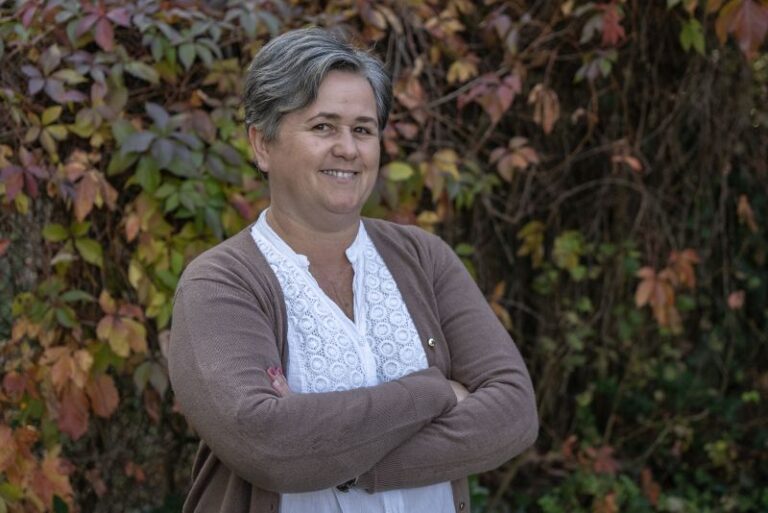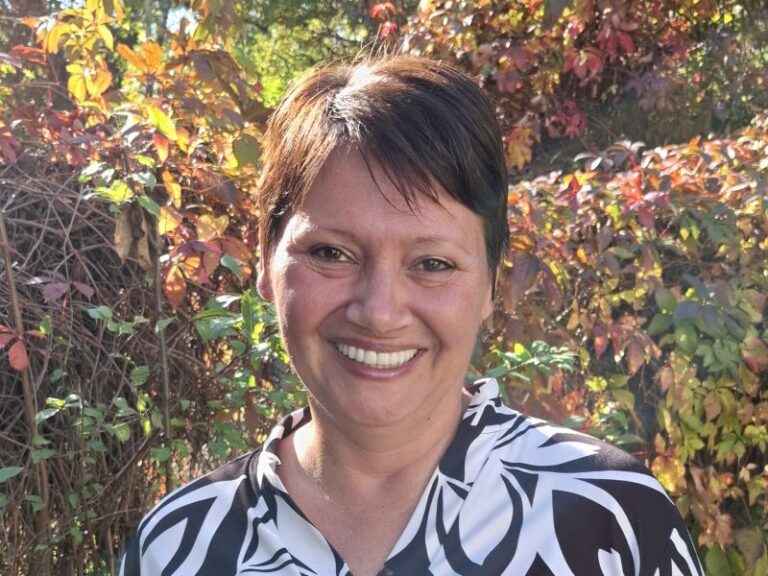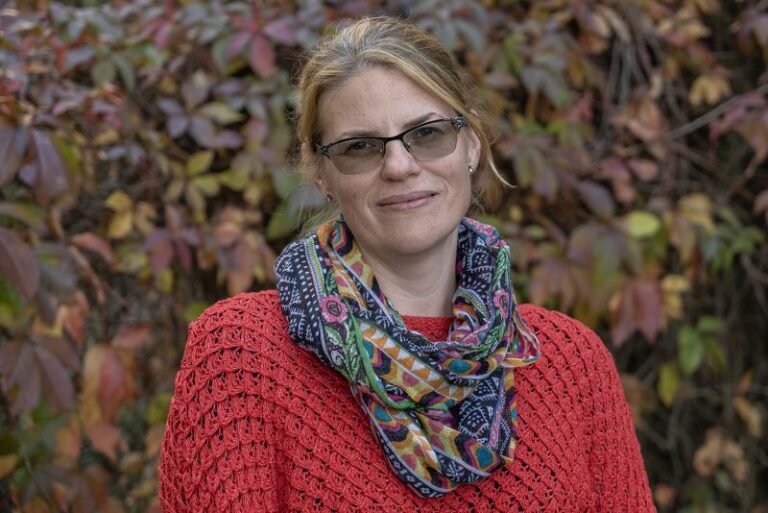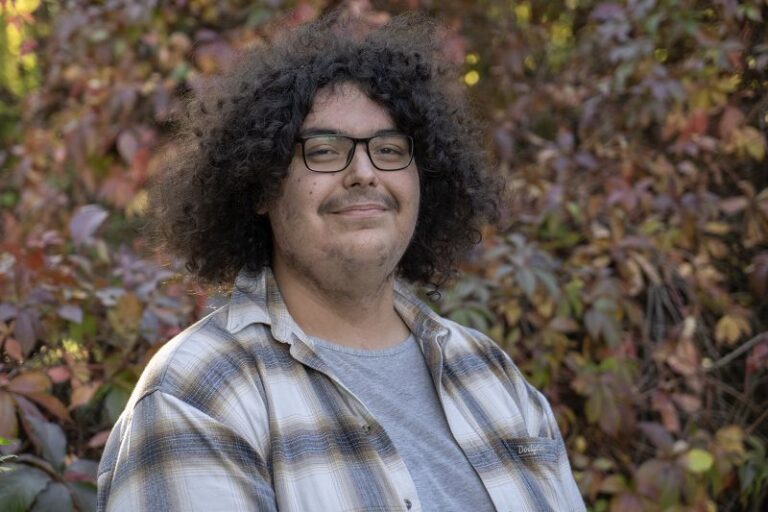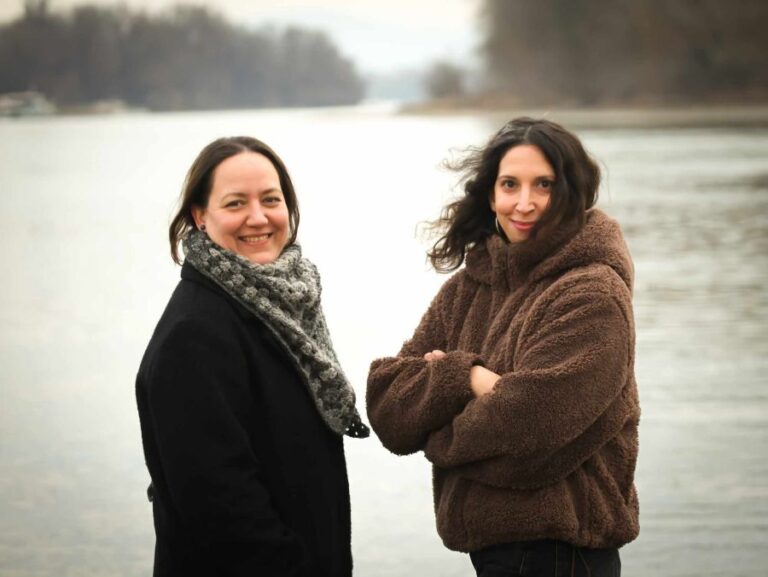She is slowly shaking up the sleepy town
Learning trail, eco-parlours, potting sheds, walking bus, story trail – a short list of the life-changing programmes that have transformed the dormitory town in Pomaz over the past three years, supported by our Revitalising Small Towns Programme. We spoke to Melinda Farkas, head of the Pomáz Ecocircle, about successes, challenges, institution building and the potential of re-framing folk traditions.
What has happened in Pomáz in the last three years and what are you most proud of?
I’m most proud of the nature trail that was opened in the spring of 2023; it was the only existing nature trail in Pomaz at that time. There was an old trail nearby, but it had completely deteriorated, but for the opening, the person who put up the old signs renovated a sign, so it was renewed. What makes the Klissza-trail very special is that we were able to share not only natural but also local history with the public, because we received a lot of professional support from the Friends of Pomaz. I was also very pleased that the locals welcomed our innovation, the “two-way” trail.
What else would you highlight from the last 3 years?
As a community we are becoming more and more connected. In 2019, we started as a study group, and then I won the KisVÁROS competition, which gave us a big boost to start our association. It wasn’t easy, we had to grow up to the task, and it was in the middle of the covid.
Did you set up the organisation because of the support of the Roots and Wings Foundation (RWF)?
We had already considered that it wouldn’t hurt to have an institution behind our activities, for example, you can only apply with an organisation in most places, but we kept putting it off, and finally we had to do it because of your support. During the covid the association was more of a cold organisation.

Have you moved in since then?
We’re living in it (laughs). We won a community development mentorship, and that also helped us a lot to deal with ourselves, to clarify how much we operate in a grassroots democracy, where the responsibilities lie, what we see as our tasks and who agrees to what. We have tried to talk ourselves out of these, but I see that these questions need to be raised again and again, for example at the beginning of each year, at the strategy-making meeting.
So you have peers, you are not a one-man institution.
Last year there were four of us, one of us took care of the administration and three of us took care of the projects. This year it looks like two of us will be left to do the latter. We have jointly agreed that we have core activities – these return every year – and projects.
What are the core activities?
On the one hand, every month we write an article in the Pomaz Citizen; we report on what we are doing, we share tips – our aim is to raise awareness.
We also organise quarterly exchange parties. At the first three you can bring and take clothes, and at the last exchange in November you can bring toys. It was great to see last year how many people look forward to the activities and the number of participants is growing, who usually not only bring clothes but also take them home; what is left over is taken in by the local family support service. Last November, we also innovated: after a request from the local book club, we added a book exchange to the toy exchange – it worked out great, the books were very well circulated.

What else do you consider a permanent activity?
We started to organise discussion groups called Eco-talk, almost every month. We have strengthened it by inviting guests since last November. In these talks, we throw up a topic, such as energy saving, chemical-free household, sustainable fashion, sustainable home decoration, sustainable nutrition, and so on.
How many of you are there?
Ten, fifteen. I would have liked many more, although last time I was very surprised to see people from Budapest and Szentendre. It’s not unusual for new faces to turn up, we’re spreading the word slowly.
Can you tell us about your projects?
For the second year running, the pedestrian bus project has been running steadily on several lines, some hectically. Last year there were five routes, this year three, but these three have become more populated, so the number of people involved is almost the same. The walking bus is about parents volunteering to walk children to school with our help and encouragement. The rule is that no more than six children can be carried by one adult, with more children requiring two adults – unfortunately Pomáz is not known for having safe pavements and roads. The buses are now self-operated, no problem, and many people walk home in the afternoon.
Last year, the participating children received ice-cream cone coupons, which they could exchange for ice-cream in a confectionery shop thanks to our organisation. The record holders who walked the longest route walked 320 kilometres each throughout the school year, and for them, the pride at the end of the year was the ice-cream cone, along with the certificate. Now that spring is coming, we want to organise a reinforcement campaign to get more people walking.
Were there any other projects?
At the end of 2022, the storytelling trail was launched, with 15 stations completed so far. The story trail means that there is a QR code on a small board and you can listen to a story related to the site on our website. We also say some thought-provoking sentences about the spot, the landscape and why we chose that particular story. You can also read the story on the website, but you need the QR code to read it, so you have to go there. Our aim is to try to bring harmony with nature back into people’s lives through the story. It is mostly families that are interested, they don’t have to go around all 15 stations, but we want them to visit the different points at different times. If our marketing sense and time allowed, we could put together a tourism package for the story trail and the nature trail…
Kindergartens and schools have also approached the association and asked us to organise awareness-raising sessions. We did not feel competent to do this, we are amateurs ourselves, but we brought to the community centre a puppet show called Mimo and Chips in the Woods by another green organisation, the Puppet for Green Foundation. This was attended by 180 children from three kindergartens, the parents did not have to pay, and the kindergartens received the storybook after the performance. Both the kindergarten teachers and the children loved the performance.
Am I right in thinking that the activities and events of the Pomáz Ecocircle are a departure from the eco-lines towards community organisation?
I would like to wink out, but at the same time we are happy to have the capacity to organise green events. We have just received an enquiry to help organise a summer camp. This year, the summer camp at the Hungarian Castle in Pomaz will be organised by the Kevély Dance Ensemble, and they want a festival atmosphere. We had a conversation, where I said that the preservation of traditions, folk culture and people’s old way of life very much resonates with what we are trying to bring back now as an environmentally conscious behaviour – what you produce, you eat, you use everything, you recycle everything. In fact, maybe we should get into the camp organisation, re-frame folk traditions and emphasise that the peasant way of life is environmental awareness. We should implement quality programmes together, so that the green line and the preservation of traditions are also represented.
You said three years ago that the same 300 people attend every community event in Pomáz, and you would like to widen that circle. You also said that being a bedroom community is the biggest challenge. What is the situation now?
These challenges still exist.
I have more of a role, because in the meantime we opened our café, where – although it is a professional business – I talk to a lot of people, and the things I share here trickle down into the eco-round brainstorming, and vice versa. Beyond that, there has been a change at the helm of the community centre, with more programming and a growing audience. With all of this, I keep hearing “Why didn’t I know about that?”. We are not reaching people enough – that is what I see as the biggest challenge now. We will have to get into social media, although I do not necessarily believe in it, especially if we want to promote ourselves without money.
There’s so much information, so many opportunities, that people are passing everything by. To grab their interest and make them believe that there are programmes in Pomaz, without having to go to Szentendre or Budapest, is a long process. Obviously, there are some gut instincts: people who have lived here for 20-30 years just look down on community life in Pomaz. So changing that can’t be a three-year job, there’s plenty of work to be done here. And of course I’m not giving up.
How do the people of Pomáz and the municipality receive your activities?
I can see that what we are doing is having some impact, in that recently, before the elections, several people asked my opinion about the future of Pomaz, and even the possibility of me standing for election in a more serious role, even as a representative, but I said no. I was happy to share my thoughts and ideas, but I would like to remain an independent citizen.
What has the support of the RWF added to your civic activity?
Obviously a lot. The money we had at our disposal kick-started our activities – the realisation of the trail, the founding of the association. With the latter, we started something that keeps rolling, we are constantly on, we are constantly doing something, we are constantly thinking about what more can be done.
If the financial support for the foundation disappears, what will replace it?
I can’t complain at the moment. We won grant money, we got a grant from the city, and two people approached us and became supporters, that is, gave us money, as a result of our activities.
Did you ask for it?
No. They said that what we were doing was very sympathetic, so they wanted to support us.
It’s wonderful. How about if you ask them?
That’s it (laughs)! We’re not even good at that, and we haven’t even pushed it too hard. We don’t have a well-developed funding plan, so we’ll have to work on that.
What has the Foundation’s professional support meant?
I met very few of the other grantees of the programme and I rarely saw my mentors, but the meetings were very rewarding: I got some good ideas and the brainstorming that started was very productive. In the joint meetings it was great to see the methodology used to run a day; I learnt a lot from this and applied the methods I had learnt.
Who would you recommend to run in our next competition?
Someone who is ready to take action, has good ideas and preferably has one or two people behind them to support their ideas – it’s hard to achieve the big dreams alone. For them, financial support that can be used with great freedom can be incredibly useful.
It’s also good if you have a three-year plan, but then life comes along – like a covid or other unexpected twists and turns – that forces you to reschedule, then new plans are always accepted. Things that are much stricter than other applications don’t weigh you down here. I think we have confidence for 3 years, and the responsibility for that is felt by all the grantees.
(Iván Bardócz)
